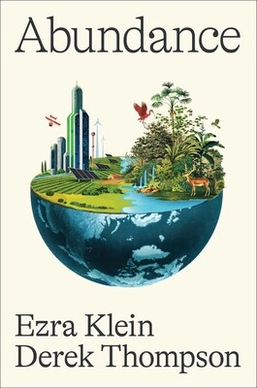Steel Rabbit reviewed Abundance by Ezra Klein
Abun-Dunce
1 star
I borrowed this as an eBook through my local library. That way, I wouldn't have to pay for it, and no one on public transit would see me reading it. I was convinced to read this because of two reasons: 1. If you really want to criticize something, you should read it. Especially so that if someone accuses you of misrepresenting any aspect of it, you can assure them that you did, in fact, read the book. 2. It is short.
The biggest problem of the book is that it doesn't address the core issue beneath all of their lamentations about the decline in American manufacturing and 'progress'. That is: moneyed interest. Instead they claim that while there may be a common thread throughout all the deficits in American gumption they cite as examples, each case is really unique in as much as they cannot be addressed by a lack …
I borrowed this as an eBook through my local library. That way, I wouldn't have to pay for it, and no one on public transit would see me reading it. I was convinced to read this because of two reasons: 1. If you really want to criticize something, you should read it. Especially so that if someone accuses you of misrepresenting any aspect of it, you can assure them that you did, in fact, read the book. 2. It is short.
The biggest problem of the book is that it doesn't address the core issue beneath all of their lamentations about the decline in American manufacturing and 'progress'. That is: moneyed interest. Instead they claim that while there may be a common thread throughout all the deficits in American gumption they cite as examples, each case is really unique in as much as they cannot be addressed by a lack of spirit or an 'abundance' of red tape. Honestly, there's not much more to say about that. They just miss it, or choose to ignore it.
As for the actual writing and craft of the book: it reads as a precocious teen's essay. Long-winded stories used as examples to emphasize a point, repetition, jumping around. Thankfully it's not written with the intent to challenge, so like reading the transcript to a podcast, you could just zone out and let your eyes do the reading.
Don't make the same mistake I did. Don't bother reading this. Disengage from those who want to talk about this book with you, or if you really can't, watch/read/listen to a critique of this book instead.



